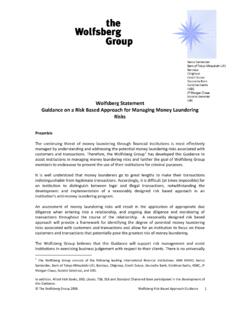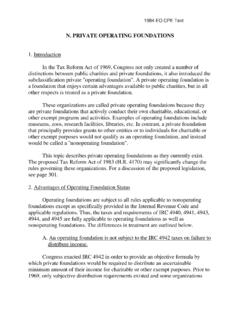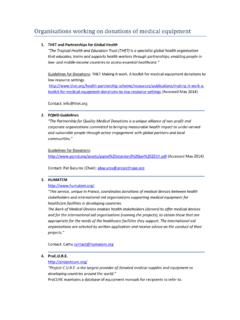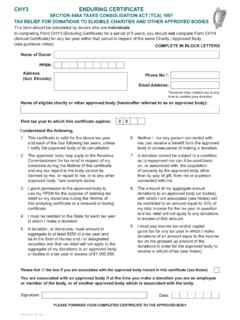Transcription of GUIDANCE The essential trustee: what you need to know ...
1 GUIDANCE The essential trustee: what you need to know, what you need to do MAY 2018 Contents 1. About this GUIDANCE 2. Trustees duties at a glance 3. Who can be a trustee and how trustees are appointed 4. Ensure your charity is carrying out its purposes for the public benefit 5. Comply with your charity s governing document and the law 6. Act in your charity s best interests 7. Manage your charity s resources responsibly 8. Act with reasonable care and skill 9. Ensure your charity is accountable 10. Reduce the risk of liability 11. Your charity s legal structure and what it means 12. Charity officers - the chair and treasurer 13. Technical terms used in this GUIDANCE 2 4 7 10 13 16 20 26 29 32 35 37 38 The essential trustee: what you need to know, what you need to do (CC3) 1 1.
2 About this GUIDANCE This GUIDANCE explains the key duties of all trustees of charities in England and Wales, and what trustees need to do to carry out these duties competently. Trustees have independent control over, and legal responsibility for, a charity s management and administration. They play a very important role, almost always unpaid, in a sector that contributes significantly to the character and wellbeing of the country. Trusteeship can be rewarding for many reasons - from a sense of making a difference to the charitable cause, to new experiences and relationships. It s also likely to be demanding of your time, skills, knowledge and abilities. Being aware of the duties and responsibilities covered in this GUIDANCE will help you carry out your role in a way that not only serves your charity well but also gives you confidence that you will be complying with key requirements of the law.
3 You should read this GUIDANCE if you are a trustee of any charity based in England or Wales, including: a registered charity a charity that is not required by law to register a charity that is required to register, but has not yet done so You should also read this GUIDANCE if you are thinking about setting up a charity or becoming a trustee in England or Wales. The charity regulators in Scotland and Northern Ireland have their own GUIDANCE for trustees. If you are involved in running a charity but don t know whether you are a trustee, check the charity s governing document. (This is the document that sets out the charity s rules; it may be a constitution, trust deed, articles of association or similar document.)
4 It will tell you which body has ultimate authority and responsibility for directing and governing the charity. All properly appointed members of that body are charity trustees in law, whatever they are called (trustees, directors, committee members, governors or something else). If you are a member of that body, you are automatically a charity trustee. You share, with all members of that body, equal responsibility for the charity. The Charity Commission expects trustees to take their responsibilities seriously. Using this GUIDANCE and ensuring you give sufficient time and attention to your charity s business will help. The Commission recognises that most trustees are volunteers who sometimes make honest mistakes. Trustees are not expected to be perfect - they are expected to do their best to comply with their duties.
5 Charity law generally protects trustees who have acted honestly and reasonably. Must and should - what they mean In this GUIDANCE : must means something is a legal or regulatory requirement or duty that trustees must comply with should means something is good practice that the Commission expects trustees to follow and apply to their charity The essential trustee: what you need to know, what you need to do (CC3) 2 Following the good practice specified in this GUIDANCE will help you to run your charity effectively, avoid difficulties and comply with your legal duties. charities vary in terms of their size and activities. Consider and decide how best to apply this good practice to your charity s circumstances.
6 The Commission expects you to be able to explain and justify your approach, particularly if you decide not to follow good practice in this GUIDANCE . In some cases you will be unable to comply with your legal duties if you don t follow the good practice. For example: Trustees who act in breach of their legal duties can be held responsible for consequences that flow from such a breach and for any loss the charity incurs as a result. When the Commission looks into cases of potential breach of trust or duty or other misconduct or mismanagement, it may take account of evidence that trustees have exposed the charity, its assets or its beneficiaries to harm or undue risk by not following good practice. How to use this GUIDANCE You may want to read all of this GUIDANCE to get a better understanding of trustees duties overall, or you may want to find out more about a specific topic.
7 As a minimum the Commission recommends that you read the summary of trustees duties in section 2: section 2 of this GUIDANCE gives a summary of trustees duties section 3 explains whether you can legally be a trustee sections 4 to 9 explain the 6 key duties of trustees in more detail section 10 explains when trustees can be liable and how to reduce the risk sections 11 and 12 provide more detail about charity structures, and the roles of charity officers section 13 contains definitions of technical terms used in this GUIDANCE The essential trustee: what you need to know, what you need to do (CC3) 3 Your legal duty It s vital that you Act in your charity s best interests Deal with conflicts of interest Manage your charity s resources responsibly Implement appropriate financial controls Manage risks Act with reasonable care and skill Take appropriate advice when you need to, for example when buying or selling land, or investing (in some cases this is a legal requirement) 2.
8 Trustees duties at a glance This is a summary of trustees main legal responsibilities, which are explained in detail in the rest of this GUIDANCE . You should read this section as a minimum, and ensure you fully understand your responsibilities by referring to the rest of the GUIDANCE as necessary. Before you start - make sure you are eligible to be a charity trustee You must be at least 16 years old to be a trustee of a charity that is a company or a charitable incorporated organisation (CIO), or at least 18 to be a trustee of any other charity. You must be properly appointed following the procedures and any restrictions in the charity s governing document. You must not act as a trustee if you are disqualified, unless authorised to do so by a waiver from the Commission.
9 The reasons for disqualification are shown in the disqualifying reasons table and include: being bankrupt (undischarged) or having an individual voluntary arrangement (IVA) having an unspent conviction for certain offences (including any that involve dishonesty or deception) being on the sex offenders register You can read the automatic disqualification GUIDANCE for charities which explains the disqualification rules in more detail. There are further restrictions for charities that work with children or adults at risk. See section 3 for more information. Ensure your charity is carrying out its purposes for the public benefit You and your co-trustees must make sure that the charity is carrying out the purposes for which it is set up, and no other purpose.
10 This means you should: ensure you understand the charity s purposes as set out in its governing document plan what your charity will do, and what you want it to achieve be able to explain how all of the charity s activities are intended to further or support its purposes understand how the charity benefits the public by carrying out its purposes Spending charity funds on the wrong purposes is a very serious matter; in some cases trustees may have to reimburse the charity personally. See section 4 for more information. Comply with your charity s governing document and the law You and your co-trustees must: make sure that the charity complies with its governing document comply with charity law requirements and other laws that apply to your charity You should take reasonable steps to find out about legal requirements, for example by reading relevant GUIDANCE or taking appropriate advice when you need to.


















